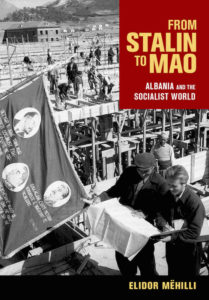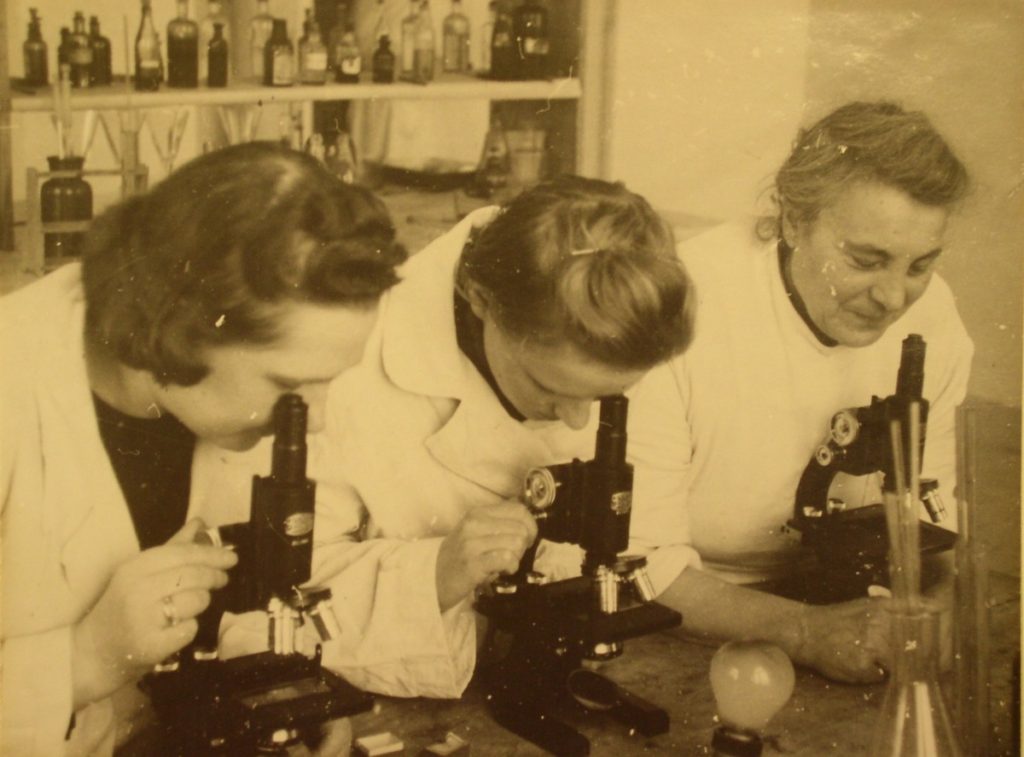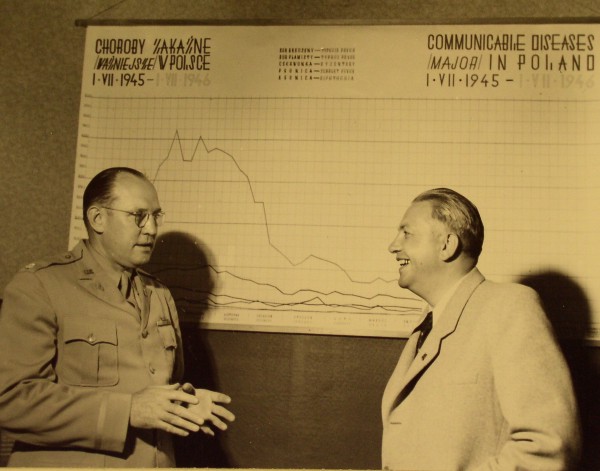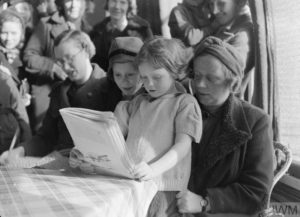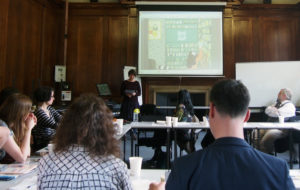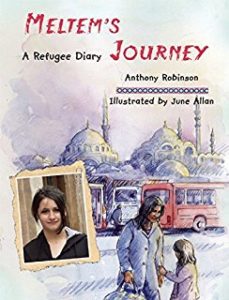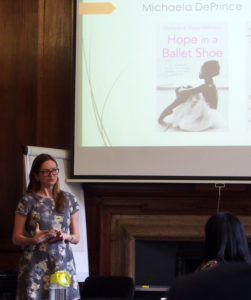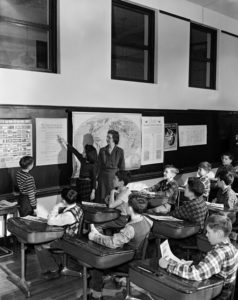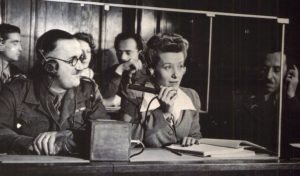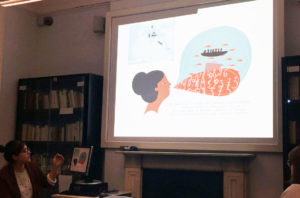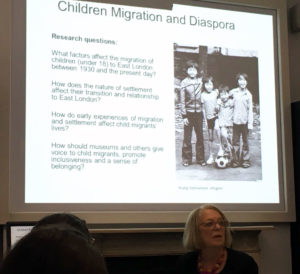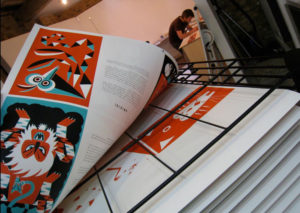Siobhan Morris recently sat down with our visiting fellow, the illustrator Francesca Sanna, to discuss her award-winning debut children’s book, The Journey, her research process, and her current work with the Reluctant Internationalists project. A transcript of the conversation is now available below.
 SM: Welcome to London and to the Reluctant Internationalists project team! Let’s start by talking about your route into illustration.
SM: Welcome to London and to the Reluctant Internationalists project team! Let’s start by talking about your route into illustration.
FS: I first studied architecture. I always studied the theory of colour and painting; I had painting class when I was in middle school and I always always had an interest in children’s books especially. After my bachelor in architecture, I had during this time, the opportunity to do graphic illustration because that was one of the courses they have there. I’m not sure you have the same here, but in Italy ever since I was young you have this feeling that you need to do something pragmatic and concrete, study something that is not just like drawing, because you need to find a ‘real job’. So, especially for this reason I went for architecture. I love to study architecture, I love to study the history of architecture, but it was not my thing. During an internship I went to a communications studio and I did an illustration project and that was the moment I decided to go with illustration. It means also very different things, you have lots of different projects, but now my main focus is back to children’s books.
SM: Well, let’s talk about your first children’s book – The Journey. It was created as a result of a series of interviews with refugees?
FS: Yes, together with more formal research – reading social papers, investigation of newspapers about the topic etc. It was more than three years ago now and it was not very easy to find anything that had to do with the theme. There were very few picture books about the topic. But first I went to the interview process. I was suggested that method for the research and we had some guidelines around unstructured interviews. That for me was a very good description of what I was doing. I was sitting with people, asking some questions, but for most of the time we were having more of a normal conversation about anything and we were sketching because we had so many problems with languages. We never spoke the same language more or less. It was normally people arriving in Switzerland and they were talking their own language which was nothing I knew about, plus German. At the time my German was terrible, so I was speaking really basic German and some English they didn’t understand and sometimes they knew a little bit of Italian because in their journeys they went through Italy. So we were sketching [and] obviously for me it was a really good tool, also for the research part.
 SM: How many interviews did you conduct in total?
SM: How many interviews did you conduct in total?
FS: Complete interviews, stories I could actually use, or read back and read again after we talked, probably about fifteen.
SM: All conducted in Switzerland?
FS: No. I went to Italy for holidays. I remember it was during the Christmas holidays. I was in a refugee centre in southern Italy because my mum worked there for a while and it was the research semester that ends in February, so Christmas was like the peak of the semester. So I thought it would be stupid to waste an opportunity, so I went there [to the centre] and this point was so important because the bad stories, for absolutely random reasons, were all there. So people I could relate to, because of the age, because they were mostly women or girls as old as I was at the time, and a series of other factors, put together a really good series of conversations.
SM: So in that sense, is the book quite personal even though it is about refugees?
FS: Yes and this is really crazy to try to explain. This is not my story, but there are details [which she can relate to]. Also this was the strength and whole point of having the interviews, was to find a point in common between me and the person I was interviewing. Otherwise it was impossible to talk about, on a really personal level, really tough topics.
SM: What were the greatest challenges then to undertaking the research?
FS: In the research, my main concern was not to be naïve. The other problem was not to have this horrible feeling of, ‘oh my God, this is so sad’, like in a pitiful way somehow. So I studied first a lot of visual material about refugees, the campaigns from the UN or UNICEF, and tried to see what was the common denominator. Of course you need to convince people to donate money, but at that time especially you had always passive depiction of the person as refugee, labelled as a refugee. Double passive actually because you have this huge label and then you also have a person crying or a poor person, or someone struggling, really vulnerable. I remember as I was writing my thesis on this, my main idea was how illustration can help passive depiction become active, because graphic novels and visual storytelling in general, are another really good tool in my opinion to show an active point of view. And while I was doing this I saw these campaigns changing a little bit to be more personal, like the UN did a series of personal stories.
SM: The research you were conducting into these campaigns – was this historical research or were you examining contemporary campaigns?
FS: No, it was looking at what they were publishing now, the websites etc.
SM: What were the challenges to undertaking the interviews?
FS: In this sense, I was really naïve! I went without any training. I knew about in Switzerland what was the procedure behind asylum seeking, so the process of having a visa after they arrived in a new country. So I knew more or less the backgrounds of the people I was talking to. So I went to the refugee centres but the interview was almost never conducted in the refugee centre, because that’s like going into somebody’s house, this was my feeling.
In the refugee centres these people were having lunch, sleeping, they had their rooms, so if I was invited in their rooms – that happened in a family refugee centre, that was really good, we had a drink together. We drank cola together, but I was invited by them. Otherwise, I tried to just get in contact, I was working a little bit with a language centre in the refuge centre, so getting in contact afterwards like, ‘let’s get a coffee together’ and having the interview like this.
So the challenges were of course except for the language, trying to find a respectful way of talking about this, these experiences from a privileged point of view without feeling guilty all the time.
SM: Would you recommend it as a research model?
FS: It worked for me in this case, but it’s also very specific. Yes, I would say without this process the book would not exist because you need to hear – the only way to hear the personal point of view is just to hear all the different people and actually it’s like putting together in the same box so many different things and so many different experiences. I think to realise this, I had to go through this process.
SM: I think that’s one of the really interesting things about our collaboration is how in history to put the personal into the wider narrative, when these people so often don’t have a voice. How do you view this collaboration, working with a group of academics on this project?
FS: This for me was the hardest part – I had the stories but it was really time consuming to collect stories and also I had the feeling I need to zoom out a bit of this situation and find papers that talked about refugees narratives. That was the hardest part, doing my own research or trying to find the interesting parts. In this sense I think it [the collaboration] is great, having a conversation with people who know exactly what the context is.
In general, as an illustrator you deal with a lot of very different things or things you don’t know much about and the hardest part is not being able to deal with people who know what they are doing. So if the focus is already there and you have a lot of academic research and so on, it is great – already having a selection of documents or readings to work on.
SM: Another thing I wanted to talk to you about were the ethical concerns. Unlike much of history, you are dealing with people’s lives as they are being lived currently. Did you feel an obligation to tell these people’s stories in a certain way?
FS: I tried to focus on what these stories had in common and I think this was an interesting point because at first I could only see the differences. So at first, these people were coming from different countries with nothing in common. But then in the stories, especially in the element of the journey, there were always elements that I could see repeating. The other approach that was kind of saving my brain from becoming too overwhelmed by the fact that these are people’s lives were the details. The way they spoke about these stories – for them it was the reality. It was nothing to be sad about. But in some parts of our conversation some points were way too much [but] my questions were never really like questions, like ‘how did you run away?’ It was never like that. We always started talking about personal stuff and then the things came out. The details really stayed with me until I started the book. It’s really strange how a person’s mind works, how you remember, how you want to communicate, say, that one detail in a story.
I keep saying this example and obviously it stayed with me until the end of the book. It was of this girl and we had a great conversation, also because she spoke perfect English. So I asked her where did she learn to speak really good English and she told me she was studying to become a flight attendant before she had to leave. And then we started a discussion about flying in general and how this could be a perfect metaphor for this whole thing, what this general story was about and how strange it is, from a really naïve point of view, how strange it is that you can just take a plane as a means of transport… If this is not an option anymore, this becomes an incredibly long journey then. You have a destination in your mind but you are moving around in a totally different way of having a journey. I know it sounds again really naïve, but to have this conversation with the person who had this experience and completely knew what it was like to take a plane and fly and she wanted to make that her job – for me this was incredible. This thing about flying and the birds that fly was really something I was shocked about [and it’s the last page of the book].
So the book is called The Journey, also because let’s call it the theoretical part, or the theory, behind my thesis was how illustration can help this journey element to be told. Because it’s like an archetype in children’s books or children’s literature, as development of a character and growth (Alice in Wonderland is one example of a specific metaphorical journey. I found a paper, [BenEzer, G & Zetter, R (2014) ‘Searching for Directions: Researching Refugee Journeys’, Journal of Refugee Studies, Oxford Press, vol. 27, no. 3 , May 2014], and it was about the importance of the journey as an element between the departure and the arrival especially in refugee narratives. Also the thesis behind this paper was that this element, nobody knew much about this and it was so important because it could show the active role. This was the same going through children’s literature and finding the same journey as metaphor in huge works of children’s literature. So I found this kind of coincidence or point was also an element that came up a lot during the interviews. The main discussions we had were about the journey, it was one of the main elements and so I decided to focus on this part.
But I also had to officially make a decision, so it was so open this topic of immigration of the longest time I thought about the theme of integration because I saw myself, I lived myself [when moved to Switzerland], the problem of learning a new language and the culture shock and so I also saw that this was something in common with everybody. We all had to struggle with German, we all had to struggle with the Swiss weather – some people liked it because they were coming from Tibet! – and with the Swiss bureaucracy. Or the reason why someone has to flee his or her home, or the reason why you would put your children on a horrible journey, what you have to leave behind, this was another point that was really interesting. It was too much at one point. I remember doing like a diagram and there are three steps. There is like a bomb or something that explodes, there is like what happens when you find your home not safe anymore. So there is everything before and everything after you arrive in a new country and of course in the newspapers every discussion is about how this is going to change our European way of living. And then there was this journey that really fascinated me because no one was talking about, no one was saying very much about this at this time. Today I think there are more documentary photographers that want to record journeys. There was this family that recorded their journey [as refugees to Europe] with a GoPro. Their journey for me was the first time I saw these things happening on a camera, it was incredible, but still a gap somehow. This was incredibly fascinating for me. So I thought ok, it can work as a growth of a character in the sense that there are obstacles and you have to overcome these obstacles and we will somehow solve the problem with these passive depictions and it doesn’t have to be about refugees –the topic is not being a refugee or let’s help refugees, it’s about how your life would change if you had to flee your country and your home and so on. Something clicked there.
SM: When we have spoken before you have mentioned that the bureaucracy around applying for asylum necessitates that refugees have to learn a story and learn what to say. Were you concerned this would affect your interviews?
FS: I was trying to prepare myself for this. So when we had a conversation, I was always saying that I was never recording. I was writing down notes that they could see. I was drawing for most of the time and for most of them this was already nothing to be concerned about. They told me, we were taking the car to go to the mountains, so I was drawing the mountains and a car going through them.
SM: That’s really interesting. People probably opened up and told you more because you are not interviewing in a traditional way.
FS: Yes, both of these two elements, my language skills and the fact that I was sketching and using sketches at the main tool, brought the conversation to the same kind of level. First, it was not them in a difficult situation and me in a privileged situation, it was the opposite actually. Also the drawing is something connected to spontaneity. This is some kind of thing which is much more emotional, it is not so clear and fixed as words. I was not really taking notes that I could have used in formal and official procedures in an interview.
SM: But it is also clear that you are telling their story, because you are literally drawing in front of them exactly what they are telling you.
FS: Someone was telling me about his really terrible experience being tortured, but being so pragmatic and showing me his scars and I was just drawing the same thing I could see. I do not think I would be able to do this with words.
 SM: I was reading an article recently where someone was asking if it is possible to create meaningful children’s books about refugees if you yourself are not a refugee, but clearly The Journey proves that it is. Do you think the book is influenced by your perspective – I know you have previously called yourself a privileged immigrant – do you think that changes how your write?
SM: I was reading an article recently where someone was asking if it is possible to create meaningful children’s books about refugees if you yourself are not a refugee, but clearly The Journey proves that it is. Do you think the book is influenced by your perspective – I know you have previously called yourself a privileged immigrant – do you think that changes how your write?
FS: I think it doesn’t, it just changed the way I was really interested in the topic from the beginning. But this would be a combination of [the fact] I was a foreign student, or an international student and I found myself discussing a lot about this political moment and especially about the topic of immigration. I live in a country now [Switzerland] that has some strong political decisions about the topic. So of course you have discussions with your family and also seeing how this topic is discussed in different countries. I was coming from Italy where this refugee crisis and immigration in general – these discussions started four or five years before it started in Switzerland – for obvious geographical reasons. And so all these pieces put together I think started this interest.
SM: So let’s talk about the use of illustrations in history and social science.
FS: I tried to put together my ideas before I started with the drawing. Why am I doing an illustrated book not a normal book? I think the main power of illustration is it can move the focus from something that can be really literal, like you have a sentence and this sentence means something happened, but then you can add so many layers to this with a picture. I would not be able to do this with writing. I played a lot on this in the book. So the text says something and the pictures say something different.
There is a very pragmatic example, because it is quite hard to explain without an example, in the book there is a smuggler and so I knew that this is a character who is always present in the story of a person who has to flee. There’s always someone who helps with the money exchange and from when you read a newspaper you have a discussion about these people. These people are criminals and because of them thousands of people die and they take profit out of desperate people. So there is a judgement about this kind of character.
At the same time, when you talk to a person who had to call the number of a smuggler, they told me that this was the only way they could, there is no legal way. It is their only option. So what do you do? You die or you go for the illegal way. So to undertake the risk is something that you almost can’t decide so there is like a blurred line. And the third problem for me was how do you explain this thing? For me it is already so hard to explain to you in this moment, so how do you explain to a child? Do you say ‘oh it’s really bad’? How do you say that? So I didn’t say it, I suspended the judgement. So you have a huge monster in the book, or a character who looks like a big monster, and there is the size element. He is big and he is moving these people around. This for me was a metaphor to say that they don’t have any choice. But you don’t know if it’s bad or if it’s good, just ‘it’ is there and they need him. And again this is something I could only do with a picture, through a series of pictures.
SM: One of the really striking parts of the book for me is the border guard in the forest and how scary and graphic the depiction of the guard is.
FS: This is because when I heard the stories, the point of highest terror is to have to go back. When you are walking for days and months and crossing borders one after the other, the idea of someone sending you back to the starting point is the scariest thing. So the first time you see the guard it is not the guard himself, but it is a big finger that is pointing to the back of the book. The directions in the book are quite important. Because they are travelling and because I live in Europe, the reading sense is left to right. So everything happens from left to right unless it is an unnatural movement – so the war arrives from right to left and the guards also. When they are travelling in the car and on the bikes, it’s super strong in the other direction. All these elements, in my theory work I call them narrative devices. As a poet would do in a poem with the use of figures of speech, you can do with pictures.
 SM: Let’s talk about using The Journey as a teaching resource.
SM: Let’s talk about using The Journey as a teaching resource.
FS: So in general what happened after this book became a book and I started using it with children, is that it kind of helps children who know nothing about these stories to learn about the stories. But children who have these experiences I have to be much more careful using it with. It’s always about the personal story and you never know their personal point of view. In general, it is about what happened to a child. This is why I would now like to explore a little more about the inner perspective, this is something I think can be done with pictures and picture books.
SM: In this way, the book is intended to tell more than one story; you are not focusing on one crisis or one family.
FS: Exactly. I really don’t want a child to see this book as, ‘oh this is about me because I’m different from the others, and this is my story’. This was absolutely not the point.
SM: So could you maybe talk a little about your experience in using the book in school workshops?
FS: I have worked in three different countries. I normally do activities that are not directly linked to the book. I also do readings and children have thousands of questions –that’s my favourite part! Also when they ask me what is the message of the book as I hate books with messages! So the idea of having done a book with a message is like, ‘oh what have I done’! I understand that there is like a message behind the book, but the main point was to start a conversation, or start a discussion. This is not easy. When you empathise with the story, it becomes like your story. It’s like an empathy exercise.
SM: I guess that’s why the book doesn’t end with a conclusion? But people find this hard because it makes them think and question what could happen next.
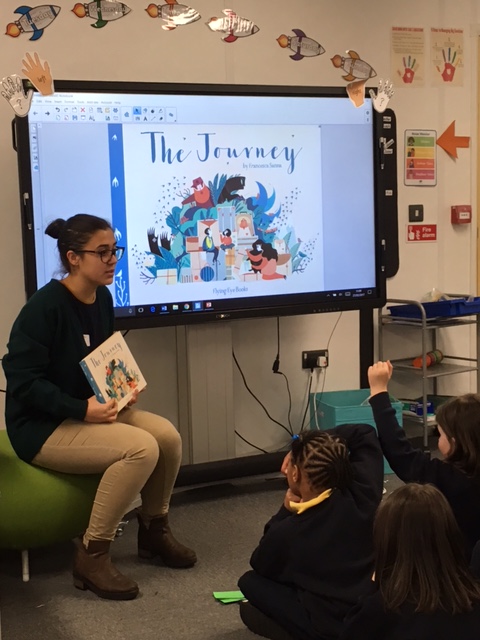 FS: Children, they hate it! A teacher sent me an email with a series of questions from pupils in the class and one of them said something like, ‘why did you end the story at the best part, the best point of the story?’ I felt a little bad! But what I answered was: I want to know your ending, how you think the story should end…Because it [the refugee crisis] is happening now, writing an ending would be first of all risky and also not useful.
FS: Children, they hate it! A teacher sent me an email with a series of questions from pupils in the class and one of them said something like, ‘why did you end the story at the best part, the best point of the story?’ I felt a little bad! But what I answered was: I want to know your ending, how you think the story should end…Because it [the refugee crisis] is happening now, writing an ending would be first of all risky and also not useful.
SM: What do you feel there is to be gained from collaborations such as this, between researchers and authors/illustrators? Because many people would regard history and children’s literature as two very distinct disciplines but is seems there may be links between them.
FS: As an illustrator or a children’s author, you never have so much space and time to take your time with the research before you actually start the book. So I couldn’t ask for anything better. I love that. When I write a book about animals, I try to go to the museum and draw the anatomy of the animals or try to kind of find the visual research that gives meaning to the work. So in this sense, it’s [the collaboration] perfect.
SM: Can we conclude by discussing the field of children’s literature in general? A lot of children’s literature nowadays is historically based, but rarely do authors work with historians – why do you think that is?
FS: In general I think inter-disciplinary projects are really hard. There are a lot of non-fiction children’s books but a lot of authors think of history as a story and then you tell this story. But it is not really like that. As I have heard a lot during our meetings already, there is not one history and in the same sense there are different ways to think of a story and using illustration you can add so many more layers.
SM: Why do you think there is a move to non-fiction in children’s literature now especially?
FS: This is an interesting question. I saw this even before I started studying illustration. A juror in an illustration competition, he was a curator of a museum, and he said that thousands of illustrators took part but ninety per cent of these were stories about animals or Alice in Wonderland. I understand there is a lot of simplification or metaphorical communication of a really important topic in a fictional way. I found it really interesting in the competition that the projects that were selected and that you could remember, you could tell that they were about something the illustrator or author was really concerned about. They were about the environmental crisis for example. Things that children are exposed to and for you as an author of the pictures, it is part of your daily discussion and part of what you sit at lunch and it always come up. I don’t know why there is a tendency [to non-fiction] now but I see it for sure. I find it really like a therapy. This feeling of being completely powerless in front of political decisions and this political atmosphere that is now around…This is the super privilege to have the opportunity to do a book because you really feel like you are doing something and especially with non-fiction you have a bigger picture. You can apply them to what is happening now.
SM: These considerations are very important to the project as well. Thank you very much Francesca!

